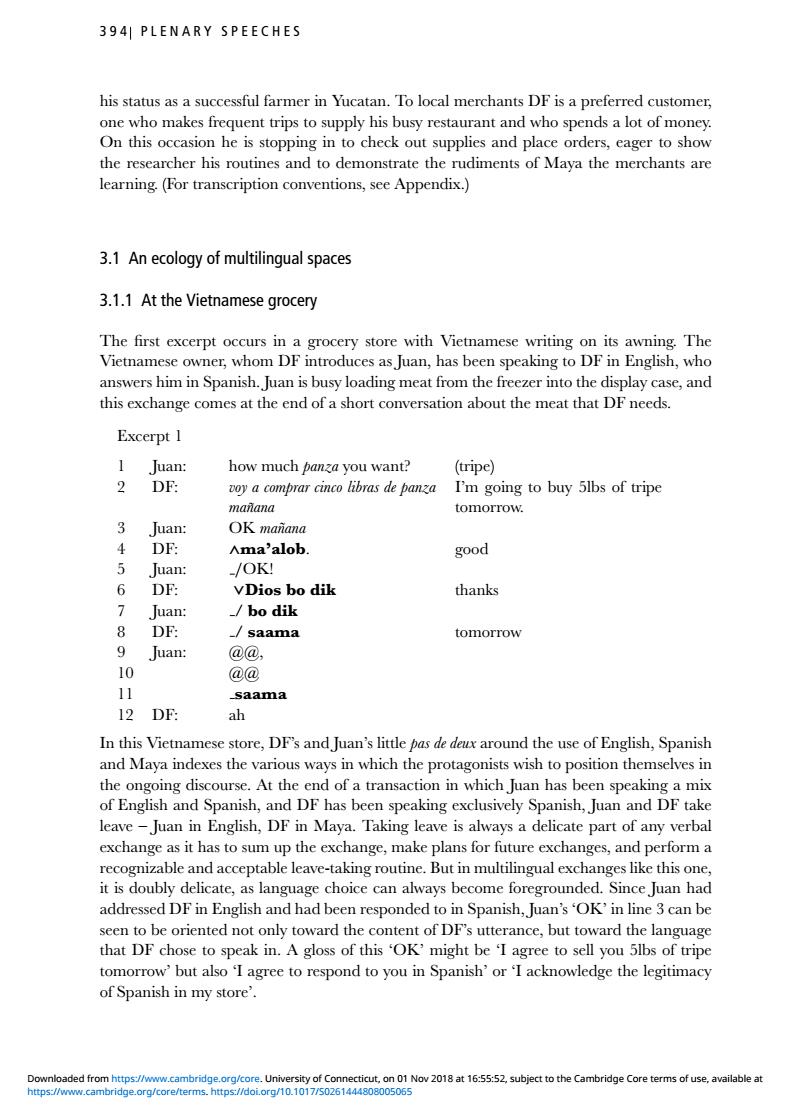正在加载图片...

3941 PLENARY SPEECHES his status as a successful farmer in Yucatan.To local merchants DF is a preferred customer, one who makes frequent trips to supply his busy restaurant and who spends a lot of money On this occasion he is stopp ing in to check out supplies and place rders,eager to show the resear her his routines and to demonstrate the rudiments of Maya the merchants ar learning.(For transcription conventions,see Appendix.) 3.1 An ecology of multilingual space 3.1.1 At the Vietnamese grocery The first excerpt occurs in a grocery store with Vietnamese writing on its awning.The er,whom DF introduces as Juan,has been speaking to DF in English,who wers him in Spanish.Juan is busy loading meat from the freezer into th isplay case,and this exchange comes at the end of a short conversation about the meat that DF needs. Excerpt I how much panza you want? (tripe) 2 DF: oy a comprar cinco libras de panza I'm going to buy 5lbs of tripe 3 uan: OK manana DE: Ama'alob. good 5 OKI 6 DE vDios bo dik thanks J /bo dik ǒ DF: saama tomorrow 9 Juan: @@, 10 @@ 11 saama 12 DF: nd Maya inde the ongoing discourse.At the end of a transaction in which Juan has been speaking a mix of English and Spanish,and DF has been speaking exclusively Spanish.luan and DF tak leave-Juan in English,DF in Maya.Taking leave is always a delicate part of any verbal exchange as it has to sum up the exchange,make plans for future exchanges,and perform a ou choice ca abva bome forroudd d acceptable leave- But in multili ingual exch es like th ince Juan ha addressed DF in English and had been responded to in Spanish,Juan's'OK'in line 3 can be seen to be oriented not only toward the content of DF's utterance,but toward the language that DF chose to speak in.A gloss of this 'OK'might be 'I agree to sell you 5lbs of tripe re toepond o you Spansh o themac 2018at vailable a394 PLENARY SPEECHES his status as a successful farmer in Yucatan. To local merchants DF is a preferred customer, one who makes frequent trips to supply his busy restaurant and who spends a lot of money. On this occasion he is stopping in to check out supplies and place orders, eager to show the researcher his routines and to demonstrate the rudiments of Maya the merchants are learning. (For transcription conventions, see Appendix.) 3.1 An ecology of multilingual spaces 3.1.1 At the Vietnamese grocery The first excerpt occurs in a grocery store with Vietnamese writing on its awning. The Vietnamese owner, whom DF introduces as Juan, has been speaking to DF in English, who answers him in Spanish. Juan is busy loading meat from the freezer into the display case, and this exchange comes at the end of a short conversation about the meat that DF needs. Excerpt 1 1 Juan: how much panza you want? (tripe) 2 DF: voy a comprar cinco libras de panza manana ˜ I’m going to buy 5lbs of tripe tomorrow. 3 Juan: OK manana ˜ 4 DF: ∧ma’alob. good 5 Juan: /OK! 6 DF: ∨Dios bo dik thanks 7 Juan: / bo dik 8 DF: / saama tomorrow 9 Juan: @@, 10 @@ 11 saama 12 DF: ah In this Vietnamese store, DF’s and Juan’s little pas de deux around the use of English, Spanish and Maya indexes the various ways in which the protagonists wish to position themselves in the ongoing discourse. At the end of a transaction in which Juan has been speaking a mix of English and Spanish, and DF has been speaking exclusively Spanish, Juan and DF take leave – Juan in English, DF in Maya. Taking leave is always a delicate part of any verbal exchange as it has to sum up the exchange, make plans for future exchanges, and perform a recognizable and acceptable leave-taking routine. But in multilingual exchanges like this one, it is doubly delicate, as language choice can always become foregrounded. Since Juan had addressed DF in English and had been responded to in Spanish, Juan’s ‘OK’ in line 3 can be seen to be oriented not only toward the content of DF’s utterance, but toward the language that DF chose to speak in. A gloss of this ‘OK’ might be ‘I agree to sell you 5lbs of tripe tomorrow’ but also ‘I agree to respond to you in Spanish’ or ‘I acknowledge the legitimacy of Spanish in my store’. https://www.cambridge.org/core/terms. https://doi.org/10.1017/S0261444808005065 Downloaded from https://www.cambridge.org/core. University of Connecticut, on 01 Nov 2018 at 16:55:52, subject to the Cambridge Core terms of use, available at